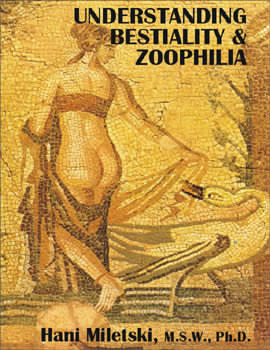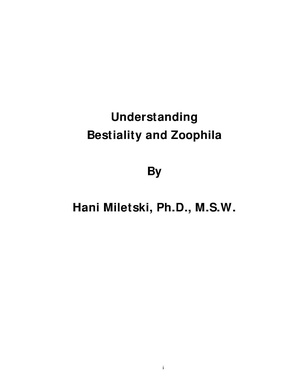Understanding Bestiality and Zoophilia: Difference between revisions
No edit summary |
No edit summary |
||
| (2 intermediate revisions by the same user not shown) | |||
| Line 15: | Line 15: | ||
| pages = 273 | | pages = 273 | ||
| isbn = 0-9716917-1-1 | | isbn = 0-9716917-1-1 | ||
| website = http://drmiletski.com/bestiality.html}} | | website = http://drmiletski.com/bestiality.html}}[[File:Hani Miletski Understanding Best.pdf|thumb|Hani Miletski, PH.D., M.S.W. (PDF)]]Understanding [[Bestiality]] and [[Zoophilia]] is a book written by [[Hani Miletski]] (Ph.D., M.S.W.) that compiles a [[history]] of bestiality, all known academic opinion on the topic, and her own doctoral study. More information about the book can be read on Dr. Miletski's [http://drmiletski.com/prolog.html Website]. | ||
Understanding [[Bestiality]] and [[Zoophilia]] is a book written by [[Hani Miletski]] (Ph.D., M.S.W.) that compiles a [[history]] of bestiality, all known academic opinion on the topic, and her own doctoral study. More information about the book can be read on Dr. Miletski's [http://drmiletski.com/prolog.html Website]. | |||
==Reason== | ==Reason== | ||
| Line 27: | Line 25: | ||
==Results== | ==Results== | ||
The questionnaire was completed by 93 participants (82 men and 11 women) who were selected on the basis of having had sex with animals. The study is descriptive, rather than representative, because the subjects were not picked randomly and the sample size was relatively small. Miletski considers that she achieves her goal, having shown that nearly all of the participants responded in ways that affirmed the three domains of a sexual orientation towards animals. This study is meant as pioneering research into a previously unexplored topic, and uncovers a general idea of who "zoophiles" are. | The questionnaire was completed by 93 participants (82 men and 11 women) who were selected on the basis of having had sex with animals. The study is descriptive, rather than representative, because the subjects were not picked randomly and the sample size was relatively small. Miletski considers that she achieves her goal, having shown that nearly all of the participants responded in ways that affirmed the three domains of a sexual orientation towards animals. This study is meant as pioneering research into a previously unexplored topic, and uncovers a general idea of who "zoophiles" are. | ||
{{People}} | |||
[[Category:Culture]] | [[Category:Culture]] | ||
Latest revision as of 04:35, 1 December 2023
| This article is a stub. You can help Zoophilia.wiki by expanding it. |
 Front cover of the book | |
| Author | Hani Miletski, M.S.W., Ph.D. |
|---|---|
| Country | United States |
| Language | English |
Release number | 4 |
| Subject | Zoophilia |
| Genre | Research |
| Publisher | East-West Publishing, LLC |
Publication date | 2002 |
| Pages | 273 |
| ISBN | 0-9716917-1-1 |
| Website | http://drmiletski.com/bestiality.html |

Understanding Bestiality and Zoophilia is a book written by Hani Miletski (Ph.D., M.S.W.) that compiles a history of bestiality, all known academic opinion on the topic, and her own doctoral study. More information about the book can be read on Dr. Miletski's Website.
Reason
Before this book was written, there wasn't one single location for a psychiatrist to gain information to help a client who came out to them as zoosexual. The scattered psychological opinion was often puritanical and misinformed. Armed with that basic knowledge, Miletski met with some zoophiles and drafted a questionnaire to help gain some insight into their hidden lives. The questions on the survey were structured in such a way as to answer her main research question, "Is there a sexual orientation toward non-human animals?", by using Francoeur's (1991) definition of "sexual orientation". A zoosexual would show:
- The existence of affectional orientation toward animals,
- The existence of sexual fantasies about animals, and
- The existence of erotic orientation toward animals.
Results
The questionnaire was completed by 93 participants (82 men and 11 women) who were selected on the basis of having had sex with animals. The study is descriptive, rather than representative, because the subjects were not picked randomly and the sample size was relatively small. Miletski considers that she achieves her goal, having shown that nearly all of the participants responded in ways that affirmed the three domains of a sexual orientation towards animals. This study is meant as pioneering research into a previously unexplored topic, and uncovers a general idea of who "zoophiles" are.